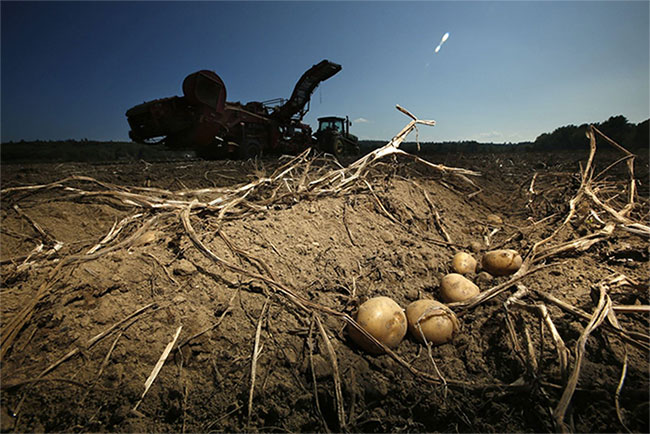US researches potato varieties that are resistant to climate change
Researchers from the University of Maine (USA) are experimenting with breeding potatoes that are more resistant to increasing temperatures due to climate change.
Bangor Daily News - the largest online news site in the state of Maine, in the northeastern United States, quoted Professor of ecology and crop management Gregory Porter as saying that warming temperatures and a prolonged farming season could lead to crop quality problems and diseases.

Potatoes waiting to be harvested at Green Thumb Farms in Fryeburg, Maine.
According to Professor Porter, experts predict that climate change will cause more rainfall, while potatoes are not suitable for long-term flooded or wet conditions. If this is the case, the quality of the potato will be significantly reduced. Therefore, Professor Porter said that if they want to continue to successfully cultivate this plant in Maine, researchers need to look at creating new varieties that are resistant to climate change.
The state of Maine has avoided the risk of a potato crop failure thanks to the success of the Caribou russet potato variety developed by University of Maine researchers. However, Prof Porter is concerned that even this cultivar may not be able to withstand extreme heat in the face of future climate change impacts.
Pests and diseases are another factor affecting potato production. Jim Dill, a pest management expert at the University of Maine Cooperative Extension, says the Colorado potato beetle and disease-transmitting aphids have thrived because of climate change. Breeding with small changes, such as hairier leaves, can make it difficult for insects to move, which in turn can reduce pests and reduce the need for pesticides, says Mr. Dill. deep.
However, breeding such traits into current potato varieties requires long-term cross-pollination between many different potato varieties. This process is being carried out relatively smoothly and is in the pilot study phase at many locations across the US. For example, scientists are studying the extreme heat tolerance of potato varieties tested in the states of Virginia, North Carolina and Florida.
Meanwhile, Professor Porter said it took 10 years of selection after the first cross-pollination and it could take two to five years before there was enough commercial evaluation for a new potato variety to be released. market.
Worldwide, research to reduce crop damage is also underway. A study by the US National Aeronautics and Space Administration (NASA) published this month found that climate change could have the opposite effect on maize and wheat farming, with maize production projected to decline in the coming years. when wheat could increase sharply, as early as 2030 under the high greenhouse gas emissions scenario.
- An Giang creates rice varieties that are flood-resistant and drought-resistant
- Loss of traditional plant varieties
- Vietnamese scientist creates rice strain against stress
- Self-control of disease-free potato varieties
- Discovering rice varieties that are 'resistant' to climate change
- Genome analysis of heat-resistant and drought-resistant cereals in the face of climate change risks.
- Thailand develops fragrant rice resistant to insects and drought
- Production of seed potatoes saves money
- This is how Dubai copes with climate change
- What is Climate Change?
- 'Super cells' defeat cancer, infection and aging
- Restores ancient potato varieties
 'Barefoot engineer' invents a pipeless pump
'Barefoot engineer' invents a pipeless pump Process of handling dead pigs due to disease
Process of handling dead pigs due to disease Radiometer
Radiometer Warp Engine: Technology brings us closer to the speed of light
Warp Engine: Technology brings us closer to the speed of light